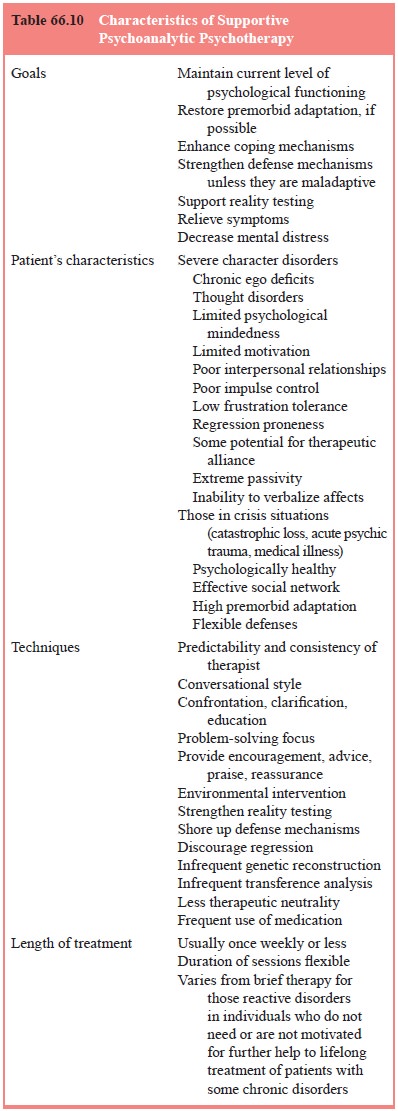Chapter: Essentials of Psychiatry: Individual Psychoanalytic Psychotherapy
Supportive Psychoanalytic Psychotherapy
Supportive
Psychoanalytic Psychotherapy
Although
only recently systematized, this form of psychotherapy provides psychological
stabilization to the patient through the vehicle of a consistent and
predictable caring therapist–patient relationship (Werman, 1984; Rockland,
1989; Novalis et al., 1993;
Hellerstein et al., 1994; Misch,
2000). Supportive psycho-therapy attempts to shore up the patient’s
psychological defenses and enhance his or her ability to cope with the trials
of illness or psychological deficits and the challenges they impose on the
patient’s daily activities (Table 66.10). Not unexpectedly, it also strives to
prevent decompensation and regression. As such, psy-choanalytic supportive
psychotherapy employs a psychodynamic understanding of the patient’s
difficulties but does not emphasize

interpretation
of the patient’s internal world. Rather, supportive psychotherapy focuses on
assisting the patient to address inter-personal and environmental challenges in
the here and now.
Despite
its noninterpretive emphasis, supportive psycho-therapy can have a substantial
impact in the lives of patients with significant ego deficits and those with
major mental illness. These patients may include those with high levels of
aggressivity, poor impulse control, overreliance on action rather than verbal
expression of emotions, compromised reality testing and limited psychological
mindedness. It is also highly effective with higher functioning patients who
have experienced recent psychic trauma (e.g., through natural disasters,
illness, physical or sexual assault, and unexpected devastating losses).
Supportive
psychotherapy techniques consist predominantly of empathically listening to the
patient’s feelings and experiences; giving advice and reassurance; offering
suggestion and helpful coping techniques; and for some patients with severe and
chronic maladaptations, gently revealing their misperceptions and how they
interfere in daily functioning. Although often unexpressed, the patient’s
identification with the therapist’s values, ideals and approaches to problems
is exceptionally therapeutic. Environmen-tal interventions through helping
agencies and the patient’s sig-nificant others are also effective supportive
techniques. Although nonspecific to some degree, these interventions are
nevertheless based on a comprehensive understanding of the patient’s strengths
and weaknesses, and are frequently instrumental in curbing self-destructive and
self-defeating behaviors. Transference is appreci-ated but the therapist rarely
interprets it in supportive psychoana-lytic psychotherapy, choosing rather to
foster a positive working relationship through other means (Pinsker et al., 1992).
Although
frequently disparaged, effective supportive psy-choanalytic psychotherapy is
often more challenging to provide than some forms of expressive psychotherapy.
Appreciating the psychological forces that are impinging on a marginally
func-tioning patient whose communicative abilities are suboptimal re-quires a
sophisticated clinical approach. Moreover, in supportive psychotherapy, the therapist
must assist the patient to modulate intense affective states that are often
frightening to the patient and to those in his or her environment. Needless to
say, such af-fects can be directed at the therapist as well. The establishment
with the patient of the requisite safe and caring relationship, which may be
frequently disrupted by both internal and external forces, is often a
significant clinical challenge.
Supportive
psychotherapy can produce significant and lasting behavioral change through the
reinforcement of health-promoting behaviors; increased capacity for
self-reflection; anxiety reduction; and development of new defenses such as
intellectualization that enable the patient to acquire a cognitive,
anxiety-reducing conceptualization of her or his difficulties.
Related Topics